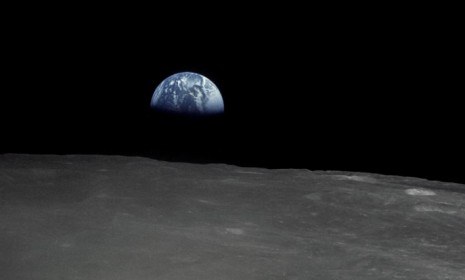How Marco Rubio could have answered that question
How old is the Earth, really?


A free daily email with the biggest news stories of the day – and the best features from TheWeek.com
You are now subscribed
Your newsletter sign-up was successful
Marco Rubio, the senator from Florida and early favorite to enter the Invisible Primary ahead of the 2016 presidential election, is a creationist. He fell into the trap laid nicely by GQ, telling a reporter that the age of the Earth is up for debate. A mystery, he said.
Well, it's not. It's about 4.5 billion years old, give or take a few million.
Sadly, many Americans don't know how old the Earth is. Interestingly, many of them, including a lot of Democrats, seem to be tugged by their religious tradition, even if they are not orthodox about their beliefs.
The Week
Escape your echo chamber. Get the facts behind the news, plus analysis from multiple perspectives.

Sign up for The Week's Free Newsletters
From our morning news briefing to a weekly Good News Newsletter, get the best of The Week delivered directly to your inbox.
From our morning news briefing to a weekly Good News Newsletter, get the best of The Week delivered directly to your inbox.
I think there's a way for Christian conservatives who believe in the literal (or proximately literal) truth of the Bible to answer the question without denying science. Denying science is not just a position; it is fundamentally a denial of modernity, which is why it is so, well, stupid, to the ears of elites, and even to the ears of folks who just know that geology isn't a just-so story. Atheists won't be satisfied with the answer, but who said that Marco Rubio has to satisfy atheists?
"Look, it's billions of years old. And I'm a Christian, and the Bible describes its creation in beautiful detail, using metaphors. I think the Bible is true. I can believe in two things at once, and I don't care if you think it's silly. One is true on its face, and that's what the scientific method has taught us about the age of the earth. I have no choice but to believe that."
"The other is true because of my faith. I choose to believe in what the Bible tells me about our origins. Science tells us what happened, and for me, Genesis explains why it did. I don't need to reconcile anything or fall into the trap of thinking that my religion and faith are at odds with each other, really. All of us Christians are on a life-long quest to understand and appreciate the wonder of creation."
"For too long, Christian conservatives have been defensive about our beliefs, and some of us have taken that to the extreme, in that we deny the very principles of empiricism that allow us to appreciate the influence of the Scripture. Creationism, or whatever you want to call it, belongs in religion class, and our pastors and theologians can use those tales to teach us important and enduring moral lessons. When it comes to public policy and science, we'll go with what science tells us. And we can also learn a lot about ourselves too."
A free daily email with the biggest news stories of the day – and the best features from TheWeek.com
"Go bother someone else with that question."
Marc Ambinder is TheWeek.com's editor-at-large. He is the author, with D.B. Grady, of The Command and Deep State: Inside the Government Secrecy Industry. Marc is also a contributing editor for The Atlantic and GQ. Formerly, he served as White House correspondent for National Journal, chief political consultant for CBS News, and politics editor at The Atlantic. Marc is a 2001 graduate of Harvard. He is married to Michael Park, a corporate strategy consultant, and lives in Los Angeles.
-
 One great cookbook: Joshua McFadden’s ‘Six Seasons of Pasta’
One great cookbook: Joshua McFadden’s ‘Six Seasons of Pasta’the week recommends The pasta you know and love. But ever so much better.
-
 Scientists are worried about amoebas
Scientists are worried about amoebasUnder the radar Small and very mighty
-
 Buddhist monks’ US walk for peace
Buddhist monks’ US walk for peaceUnder the Radar Crowds have turned out on the roads from California to Washington and ‘millions are finding hope in their journey’
-
 Why Puerto Rico is starving
Why Puerto Rico is starvingThe Explainer Thanks to poor policy design, congressional dithering, and a hostile White House, hundreds of thousands of the most vulnerable Puerto Ricans are about to go hungry
-
 Why on Earth does the Olympics still refer to hundreds of athletes as 'ladies'?
Why on Earth does the Olympics still refer to hundreds of athletes as 'ladies'?The Explainer Stop it. Just stop.
-
 How to ride out the apocalypse in a big city
How to ride out the apocalypse in a big cityThe Explainer So you live in a city and don't want to die a fiery death ...
-
 Puerto Rico, lost in limbo
Puerto Rico, lost in limboThe Explainer Puerto Ricans are Americans, but have a vague legal status that will impair the island's recovery
-
 American barbarism
American barbarismThe Explainer What the Las Vegas massacre reveals about the veneer of our civilization
-
 Welfare's customer service problem
Welfare's customer service problemThe Explainer Its intentionally mean bureaucracy is crushing poor Americans
-
 Nothing about 'blood and soil' is American
Nothing about 'blood and soil' is AmericanThe Explainer Here's what the vile neo-Nazi slogan really means
-
 Don't let cell phones ruin America's national parks
Don't let cell phones ruin America's national parksThe Explainer As John Muir wrote, "Only by going alone in silence ... can one truly get into the heart of the wilderness"
